Tagged: Life
Introducing: Starling Social
- by Alyson Shane

What is Starling Social?
Starling Social is the name of my business. We specialize in social media management and copywriting (content marketing) designed to help our clients tell their stories and connect with their customers.
I started freelancing in the summer of 2014, and while working under my own name was great for a while, I realized that as my business started to grow and I began to bring on sub-contractors to help me manage my workload, that using my own name just wasn't going to cut it anymore.
I've been working on launching my new brand for the last half of 2016, so this feels like a really long time coming. I'm really excited to finally be sharing this news with all of you!
You can read more about Starling Social on our first blog post.
What Does This Mean for My Blog?
What it means is that I can (finally!) get back to the kind of writing that I enjoy: the kind which doesn't have to stick to a certain style, which discusses more of my life, opportunities, thoughts, and experiences.
One of the challenging things about being a freelancer was that I had to shift the primary focus of my blog to topics relating to my professional life. I've always been a big supporter of knowledge sharing, and by publishing content that was helpful and informative to others, it also helped demonstrate that I knew what I was talking about when it came to social media and content marketing.
While it was fun and refreshing at first, I quickly started to realize that the more I blogged about what I did, the less I blogged about who I am. What I care about, my values, and so on.
With this in mind, one of the biggest changes you'll notice here is that I'll be blogging more about my life. What I'm up to, my thoughts on being an entrepreneur and business owner, etc, reflections on my industry, and so forth.
What Comes Next?
You can follow along with everything that Starling Social is up to by visiting our website and blog, and following us on Facebook, Twitter, and Instagram.
You can also sign up for our newsletter and get a FREE copy of my new ebook Get Social! Content Marketing for You and Your Brand.
And me? I'll still be here, blogging away like I always have.
So hello, and welcome back. I've missed all of you.
Elle at the PTE
- by Alyson Shane

There are few things as powerful as a strong one-person performance, and while Severn Thompson's performance in Elle wasn't completely solo, the 90 minutes that she spent on the stage, almost entirely on her own, were appropriately gripping and moving.
Exploring French-Canadian History
Elle is a theatre adaptation of the Douglas Glover’s 2003 novel of the same name which is currently playing at the Prairie Theatre Exchange. The story focuses on the tale of harrowing survival in pre-colonial Canada, and weaves in themes of feminism, magic, and terror into a gripping performance that demands to be seen.
The play, and the novel upon which the play is based, are an interpretation and expansion of the incredible story of Marguerite de La Rocque de Roberval, played by Severn Thompson, a French noblewoman who travelled to Canada and was marooned on the Isle of Demons, a phantom island, an island off the coast of Newfoundland. She was marooned by the captain of the ship, her relative, who dumped her overboard as punishment for taking a lover during the voyage.
Marguerite is joined by her lover Richard, her maid Damienne, and a boat full of broken tools. Discovering that she is pregnant, she struggles through a series of hardships as her pregnancy progresses: Richard becomes ill and dies; Damienne, too, eventually succumbs to starvation and sickness, and, pregnant and alone, Marguerite's spirit begins to break.
A character who began as a confident and aloof young woman is suddenly left to face the harsh Canadian winters alone, and Thomson's portrayal of a woman whose spirit is breaking in front of you is chilling take on dark humour, to say the very least. As she climbs inside the skin of a bear, worn-out, cold, and ready to give up, she is discovered.
Itslk, played by Johnathan Fisher, is an Indigenous hunter who believes that Marguerite is a spirit, having watched her emerge from inside the bear. He teaches her how to hunt and cook meat, and the real and spirit world begin to blend as Marguerite becomes more in touch with her newfound home.
Intimate and Gripping
Being the sole (or largely solo) actor on stage can be daunting, and often falls flat, but Thompson's depiction of a woman going through a traumatic experience and surviving managed to be both alarming and darkly funny. At times, when Thompson is describing their dire state on the island, living off of “books, bird bones and tennis balls” you almost feel bad for laughing as she trounces around the stage.
The most striking part of the performance, however, was how the stage was integrated with the story. The entire play takes place in front of a large structure which resembles a rib cage (an homage to the bear Marguerite finds, perhaps?) and is the perfect play to see at the Prairie Theatre Exchange because of the smaller stage size and the intimate setting.
By using a long sheet and wrapping it in various ways around the structure the stage is transformed from a ship, to a tiny tent, to the belly of a bear, and more. At one point, while Thompson wound herself up inside the sheet, crying out, it could almost be believed that she was truly losing her sanity.
Elle is a play worth seeing, and a reminder of the hardships that faced both colonists and Indigenous peoples alike all those centuries ago.
Why I Marched
- by Alyson Shane
Before I go further, I want to acknowledge that the march I'm discussing was held on Treaty 1 territory.
I mention it because it's important for me to acknowledge that I marched for treatment, rights, and freedoms that many Indigenous people, particularly Indigenous women and girls, still do not receive despite the fact that we marched on their traditional lands.
I also want to preface my post by saying that as a white cisgender female, born in Canada to a middle-class household, with a post-secondary education, I understand and accept my privilege. I do my best to be aware of that privilege and to be respectful and accepting that there are gaps in my perspective, knowledge, and understanding. I want to be clear that my perspective can't (and shouldn't) be representative of, or exclusionary to, others. I also apologize in advance if I unintentionally exclude a specific group from this post - it's not my intention to do so, I am just going to write what I can from the heart in the best and clearest way that I know how.
Without further ado.
Why I marched
I marched because I believe in equal rights. I believe that everyone, regardless of their sexual orientation, gender identity, place of birth, skin colour, mental or physical ability, and religious beliefs should have a place within our society. Everyone has the right to feel safe and respected, and I support a movement which makes equality one of its core principles.
I marched because I stand as an ally behind the LGBTQIA community. I recognize that there are struggles and issues that I can't possibly start to understand due to my privilege as a white cisgender woman, but I stand behind these groups as an ally because I believe that we should be able to love whomever we want, and to have our sexual and gender identities respected and supported by our families, communities, and governments.
I marched because I value our sexual and reproductive rights. I believe that everyone deserves to have access to medically sound, high-quality sexual information and counselling, reproductive care including birth control, and access to safe, legal abortions regardless of their income, sexual and gender identity, race or religious belief. I support helping individuals make well-informed and medically sound decisions about their bodies and sexual and reproductive health.
I marched because I stand as an ally behind minorities and POC. As a white woman I accept that there are struggles that I will simply never face due to my skin colour. With that in mind, I do my best to be an ally to movements like Idle No More and Black Lives Matter. I acknowledge that it is not my place to fight on behalf these groups, but to express my support in the ways which are appropriate.
I marched for our planet. I believe that we have a responsibility to take care of our planet, and to stop putting our convenience and comfort before tackling issues like climate change. We need to end our dependency on fossil fuels and transition to green, renewable energy sources which won't cause further damage the planet and put the future of our species and the rest of the life on this planet at risk.
I marched because I have made mistakes. Opinions grow and change over time, and I know that in the past I have made thoughtless and hurtful comments, and have acted in ways which could have been more kind and well-informed. I am continually doing my best to learn to be an ally, and to learn from my past missteps and do better moving forward.
I marched for my future children. I want to bring children into a world where they don't have to feel ashamed of who they are, what they look like, what their mental or physical capabilities may be, and who they love. I want to be a part of a movement which encourages the best in our society, and which is pushing for a future that I can be proud of.
What can we do now?
Naysayers on the internet and elsewhere have tried to downplay the importance of this movement, saying that it will "die out", "go nowhere" after the initial march has ended, but don't believe them. The cause will only die out if we stop caring about each other and putting in the time and effort to make our voices heard, and that won't happen.
Here are some ways that we can do our part to keep this movement alive:
Acknowledge our privilege
It took me a lot longer than I care to admit to come to terms with my privilege. It's hard and uncomfortable to look critically at yourself and realize the ways in which society treats you differently than other people, but being able to is essential to being an empathetic ally to other groups.
If you aren't sure what any of this means, BuzzFeed has a handy and easy to understand quiz which breaks down some ways in which you may be more privileged than others.
Speak out + listen back
Talk to the people around you about politics and issues that you care about. If you don't feel like you care about any issues, read a few news articles and make a list of the things that you agree and disagree with. Now, google those points and learn as much about them as you can.
Next, ask the people around you what their thoughts are on those topics. Don't be afraid if they're different that yours: instead, look at it as a chance to learn about a different perspective than your own. Ask questions and be curious and respectful, even if you disagree.
Don't be afraid to be wrong, or to admit that you don't know something. Everyone is learning all the time, you and me included.
Get out there
It's easy to be an armchair activist, but until we start getting out from behind our computer screens and showing up to events in our community we can't really begin to understand what other people are thinking and feeling.
Show up to town hall meetings, political debates, free lectures and rallies when you can. It's okay if you don't feel comfortable, and don't know what to say or do. Just showing up and listening is more than a lot of people are willing to do.
If you live in Winnipeg and want a friend to come with you, let me know and I'd be happy to join you.
Did you attend any the Women's March rallies? What were your experiences like? Tweet at me or tell me in the comments, because I'd love to hear from you!
Setting Intentions for 2017
- by Alyson Shane
2016 was a whirlwind year, and now that I'm home from our holiday trip to Windsor to visit John's family I finally have a little time to think, reflect, and plan my next moves for the coming year.
I'm not a big believer in "resolutions" to be honest; I prefer to look at each new year as an opportunity to commit to doing more positive things in general, rather than saying "this year I'll read 50 books!" or "I'm going to enter a bodybuilding competition in 2017" (lols for days).
Below are a few of the intentions I plan to set for the coming year, and some tips to help you set (and really work towards!) your own:
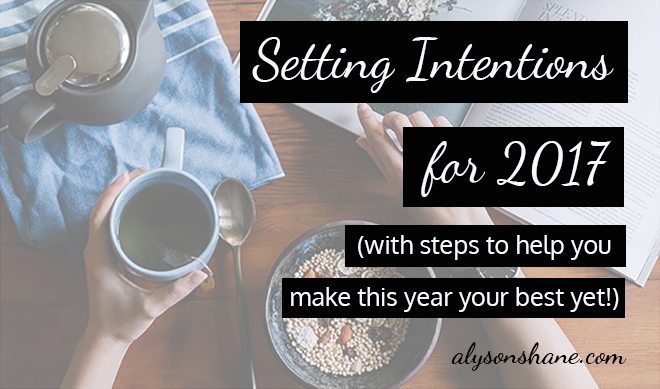
Do more yoga
A few months ago my friend Jackie and I went to Moksha Yoga Winnipeg for some hot yoga, and as I sweated and strained I felt the same kind of runner's high that I sometimes feel during a particularly good run. I left the class feeling renewed, exhilarated, and sweaty as hell, and it was wonderful.
Since then I've been trying to work doing yoga into my regular workout routine; I've been doing this easy 10-minute video at home during my 'lunch break' each afternoon. It's fast, simple, and a good way to break up my workday and spend a few minutes in a (somewhat) zen-like state.
In addition to all the feel-good mental benefits associated with doing yoga it just feels good to connect with my body and stretch out muscles that I don't normally use while sitting at my desk typing to you.
Your turn
Do you have any fitness goals in the coming year? Whether it's taking up running, swimming every day, or just stretching more during your linch break, here are some things to keep in mind:
- Costs. How much are you spending on fitness already? Are you willing to spend more? If you need special equipment, are you willing to invest additional funds?
- Time. Ask yourself honestly: how much time will this take each day, or week? Include travel time, changing, showering, etc in your estimate.
- Other obligations. Saying "I'm going to go to the gym every day!" is great in theory, but harder in practice. Block an average workweek out by hours, including commuting, meal prep, and other daily tasks to see how much time you reasonably have to meet your goals.
Delegate more (effectively)
One of my biggest learning moments came last year when I found myself looking dejectedly at the Crowdfunding Crash Course ebook I had been putting together. I'd spent heaps of time compiling the existing interviews, blog posts, and a bunch of extra goodies into an ebook format, only to totally and utterly lose steam when it came to designing the layout, which I didn't want to do.
I kept putting off the thing I didn't want to do until it felt like I'd put it off too long and the project felt irrelevant. I beat myself up really hard over it, and it's hard even admitting that I let it stagnate. However, it taught me an invaluable lesson: delegate tasks you don't like to the people who can do them for you.
That's why of my personal and professional goals is to delegate more of my workflow to others, and to learn to do so more effectively. Delegating properly and supporting the people who you work with means developing the proper systems to manage everyone's time and keep things on track, which I need to spend more time doing this year in order to meet this goal.
Your turn
Whether you're working in an office, a stay-at-home mom, or a busy business owner, knowing where you need help and asking for it can go a long way towards good mental health. Below are some things you can ask yourself before you start pushing to-dos off your plate:
- What tasks or processes do I enjoy doing the least? We tend to put off and procrastinate on tasks that we don't enjoy. Identify the ones you like the least (doing your taxes, following up with clients, etc) and find people who can help you do them.
- Ask: can I trust this person to do a good job? Take time to talk to and properly vet anyone you're thinking of delegating a task to, especially if it's a business-related one.
- Let go. If you believe that you can trust someone to help you manage your to-dos then trust in their abilities and don't stress too much. Make sure to review everything they do, but give them the space and support to do it properly.
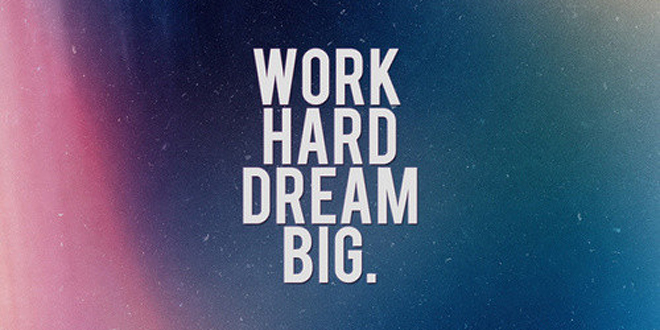 (ooooh yeah, the new year means motivational images like crazy)
(ooooh yeah, the new year means motivational images like crazy)
Spend more time on business development
This dovetails into delegating more effectively; when you run your own business and are managing client expectations, pitching ideas, going to meetings, writing copy, and doing all of the other day-to-day tasks that involve running a business it can be easy to forget about the most important business you manage: your own.
I've asked many mentors and friends about this, and they all agree: the first thing to slip when you start getting busy is your own business development. However, ongoing business development is critical when it comes to long-term success, and in 2017 and the following years I want to make more time to focus on building my business as well as my clients' businesses.
Some steps I want to take in this area are:
- Redefining "work". Most people look at business development as work, but writing and being creative are things that I enjoy, and I need to start re-framing business development as things I like doing in my leisure time when I'm not taking care of clients.
- Delegate more effectively. This deserves a second mention because I struggle with it and it will be essential to finding time for business development. Being too busy blocks my creative process.
- Work in inspiring places. Sitting at home with my laptop on a Saturday afternoon feels a bit boring, so getting out to coffee shops and bars where I can sit and work outside of the house will help me feel invigorated and encourage me to be creative.
Your turn
While my focus is on business development, the steps below are designed to help anyone with a creative passion that often takes a backseat to other things in life:
- Assess the benefits. Write down the benefits of spending time on your project. Some benefits could be "improve my craft or practice", "move my business forward", "earn more revenue" etc.
- Schedule in time. I talk about scheduling a lot because it is the most important way to stay on track. Look at your calendar and block out time to work on your projects or hobbies, and stick to them.
- Find mentors and inspiration. Talk to other like-minded people in your field, join an active Facebook group for people with similar interests, and read blogs and books about your passion or hobby to stay inspired.
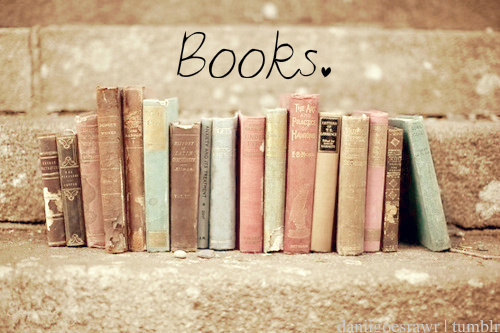
Read more books
One of my favourite things to do is start my workday with a thermos of coffee and the front page of HackerNews (among others). I spend 20-45 minutes every day reading articles, bookmarking important information, and adding to my list of resources.
However, as many of you know there's a big difference between reading several articles a day and reading a good, old fashioned book.
Last year I read about a dozen books, which is pretty good, but I read pretty quickly and honestly there's no excuse other than I've chosen to prioritize other things. This article about finding time to read was a bit of a slap in the face, and has helped me decide to make reading physical books a priority this year.
Your turn
Making time to read more can be challenging (believe me) but below are a few things you can do to make more time to sink into a juicy novel or two over the coming months:
- Schedule in time to read. I find that it's easiest for me to make time to read before bed, after my day is done and I can relax. If this doesn't work for you, make a point to read on your lunch break, during your commute (if you don't drive) or over your morning coffee.
- Make a list of books you want to read and review it often. Fill your list with books by people you admire, interesting fiction (reading fiction makes you a better person), and books that capture your interest and which you are genuinely excited to read.
- Prioritize reading. It's easy to get sucked into an Instagram black hole or get swept up with the latest mobile game, so put your phone face down and store your laptop out of view. Focus on your book (or e-reader) and nothing else for as long as you can. Trust me, it'll be hard at first but the more you do it the longer your attention span will get.
Forgive more readily
Forgiveness is hard. It's easy to stay mad at people, or to hang on to hurt feelings and resentment. I told my therapist today "it's easier to be angry than it is to empathize with someone" and it's true, but hard things are the things worth doing because they make us better people in the long run.
2016 was the year that I started to learn to forgive people: my parents and family who failed me, people who hurt my feelings, acquaintances or strangers who spoke or acted thoughtlessly, and, most importantly, myself. I started to learn to forgive myself.
With that in mind I'm going to do my best to be a positive influence on those around me, and to learn to forgive more easily and not hold onto anger, resentment, and guilt.
Your turn
It seems like everyone has an axe to grind with 2016; whether it's the loss of a favourite celebrity, a personal issue that you haven't resolved, a conflict with a coworker, or something else, below are a few ways you can move towards forgiveness this year:
- Accept that you can't change people. Many of us spend heaps of time stressing and worrying about other people (myself included) but the key to letting go is to accept that you can't change how people think, feel and act. You can only do the best you can and hope that others understand your actions.
- Stop creeping. Social media has made it easier than ever to "check up" on people, but opening up that Incognito tab only helps hold on to any negative feelings you may be harbouring. It won't make you feel any better, so just don't do it.
- Recognize that you're doing the best you can. You aren't perfect. You'll say awkward things, unintentionally hurt other people's feelings, and misstep because you're human. It happens, so do your best to say "I made that mistake, but now I know and I can do better next time."
What are your intentions for 2017? Tweet at me or comment below and let me know what you're doing in the coming year.
The Catharsis of Crying
- by Alyson Shane
How many times did you cry this week?
I cried 4 times.
- On Tuesday: I felt overwhelmed with my workload for the week (short weeks are hard.)
- On Wednesday: I was thinking about my Grandma, and was excited about seeing her this Christmas.
- On Thursday: In therapy (obviously.)
- Today: Watching this interview with Gord Downie and realizing how short my time with the person I love might be.
This used to be something that I was embarrassed about, but over the past few years I've come to accept that crying is just part of my existence. I used to fight it, and try to hold the tears back whenever they came, but these days I just let it out.
It's the best thing I've done for my mental health, if I'm being honest.
A Cryin' Shame(ing)
When I was growing up, my family members made fun of me for crying so much. I've always been moved to tears easily; the second something tugs at my heartstrings - good or bad - my eyes well up. My aunt once told me that she "worried that I was depressed" as a teenager because I cried at the drop of a hat.
In our household, crying was seen as a sign of weakness and something to be ashamed of. Allowing other people to see real manifestations of your feelings wasn't appropriate, and we were regularly warned against the dangers of sharing our thoughts and feelings with other people.
I remember, once, after a breakup in high school, I was crying in my room and my mother popped her head in to see what was wrong. I said "I'm so sad" and she replied by saying "I hope you don't act this way in front of your friends, or they'll start to get tired of hearing about it and stop being friends with you."
My family, which is of British descent, subscribes to the "suck it up" mentality: publicly displaying emotions of heartbreak, sorrow, or anything other than the status quo was always strongly discouraged, and my brothers and I were shamed and often belittled whenever we allowed our emotions to "get the better of us."
But in the last few months and years I've allowed myself to start getting over those fears. When I feel overwhelmed (which is often, running a business is a scary and often stressful undertaking) I just allow the few tears to come, and then wipe them on and move on with my day.
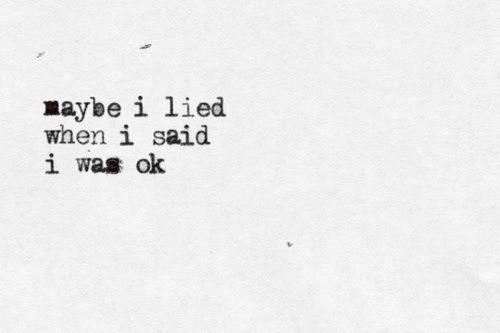
Anxiety and Crying
I have anxiety.
Anyone who has ever felt anxious knows that the plethora of negative emotions that come with it can often feel completely overwhelming, and for a long time I felt guilty because I used crying (secretly) as a coping mechanism. I cried in bathroom stalls and in my apartment when nobody else was home. When I was a kid I would go for long, extended walks through my neighbourhood because I didn't want my family to see or hear me crying.
For years, whenever I cried, or felt like I was going to cry, I would shame myself and feel guilty for not being able to prevent it.
I can't control my emotions.
I'm immature because I need to cry.
I'm not a good person because I cry easily.
However, in therapy (and with some supports from my friends and partner) I've come to realize that crying is just a part of life, and is a normal part of being in touch with my emotions. I used to feel guilty and get upset whenever I cried because I was trying to hide from my own thoughts and feelings, and I am so done with feeling guilty over crying.
Crying and Coming Together
The thing that's changed the most for me, and what led me to write this post, is that crying in front of other people has had the opposite effect from what my family told me it would: it's brought me closer to them.
John and I cry in front of each other regularly. Often, when we talk about our lives, our families, or our feelings for each other, one or both of us will start tearing up. Sometimes, when I talk to my friends about my anxiety, or things that are challenging me, I shed a few tears. And you know what? They don't hate me for it, and it doesn't make them want to be my friend any less.
In fact, knowing that I can be open with the people in my life in such a deeply personal way has been illuminating and life-changing. I can be myself; my sometimes-sad, anxious, messed-up self, and I can cry about it and be honest about it and it's the healthiest change that I've made in a long time.
Benefits of Crying
In fact, crying is actually good for you. Here are a few reasons why:
- Tears remove toxins. Tears actually remove toxins from our bodies. Tears help humans remove chemicals that build up during emotional stress.
- Crying relieves stress. Ongoing levels of stress can increase your risk of a heart attack and can damage your brain, and crying can help alleviate those stressful feelings.
- Crying lowers your blood pressure. Crying has been found to lower blood pressure and pulse rate immediately after a "big cry."
- It reduces manganese in the body. Crying reduces the body's manganese level. Manganese is a mineral which affects our moods, and is found in up to 30 times greater concentration in tears than in blood serum.
- Crying means you're human. All mammals' eyes are moistened and soothed by tears, but humans are the only mammals who express tears as a response to emotional stress or stimuli. Tears (and showing emotions) motivate us to empathize with each other, which encourages us to work together and survive.
So you know what? The next time you're feeling overwhelmed, or really happy... just cry it out. Hell, ugly cry if you must. There's no shame in it (as I'm slowly learning), and it's actually really good for you to cry it out sometimes.
Here's to a good cry!
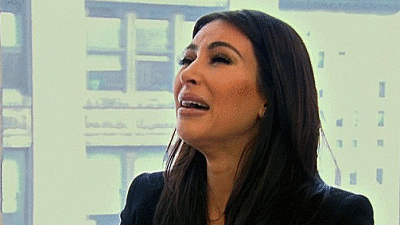
Reflections on 365+ Days of Business Ownership
- by Alyson Shane
A few weeks ago I passed a significant personal and professional milestone:
June 30th, 2016 was my one-year anniversary as a full-time business owner.
The past 365+ days have been an incredible journey; I've learned a lot, made mistakes, discovered a lot about myself and my life has changed in so many ways that it felt appropriate to share some of the things I've learned this past year with all of you:
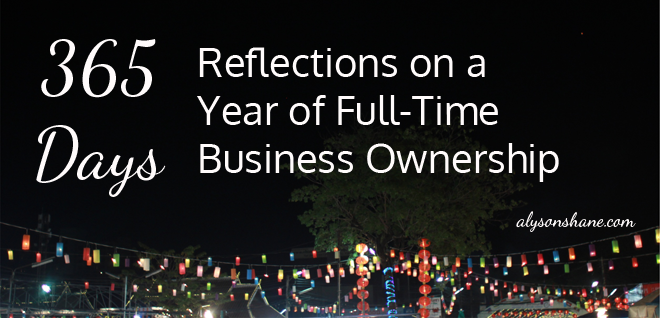
It's okay to not be a "good employee"
I'll be honest with you: I used to get depressed when I thought about my career. Even after going to university and working roles that were actually in my field (instead of being an accountant, oh my god) I'd still hadn't found a job that did it for me. I'd think of all those years ahead of me, likely spent in dull offices, trying to find a position or organization that hopefully wouldn't bore me to tears after six months and it was so depressing.
I also had a lot of anxiety around being a "good employee." I didn't like sitting at a desk for a pre-determined amount of hours, asking for permission to take an extended lunch or book an appointment, taking a vacation, or playing office politics (ugh). I'm also not afraid to stand up for myself and point out when I think something unfair or just plain wrong, which doesn't bode well in the world of 9-5's.
So what feels different? The biggest thing is that while I'm beholden to my clients, and I technically have more "bosses" now than I did before, we have a mutually respectful relationship which can be hard to find in the office world.
I'm honest with my clients, and they rely on me to create the right content and steer them in the right direction, which results in a level of respect and collaboration that I was never able to enjoy when I worked for someone else.
Your value isn't just tied up in your qualifications
Before I went to university the advice everyone gave me was "you have to go to university! You'll never be able to get a decent job if you don't go to university!" So that's what I did. I spent three years at the University of Winnipeg earning my Bachelor of Arts, and you know what? Not one of my clients has ever asked me about my formal education.
To be clear: I am in no way saying that getting an education isn't worth it. University was an amazing experience, and I learned a lot, but when it comes to running a service-based business my experience has been that it's more important to be able to demonstrate your value and your skills than it is to have a piece of paper that declares it for you.
Instead, people look at my website, blog, social feeds, and where I've been published or asked to speak to see examples of my knowledge.
You can say no to things that you don't want
One of the most empowering things that I've learned in this past year is to say "no" when something doesn't make me feel good. I don't take on projects that I don't want, and I don't work with clients that I don't like.
This is incredibly hard to do; we're conditioned to believe that every opportunity that comes our way may be the last, and especially when you're new to being a solo business owner it's hard not to think "if I don't take this, will I regret it? Why am I turning down money? Who in their right mind turns down money?!"
Except money isn't the key to happiness. Instead of chasing money, I chase value. I've turned down opportunities that could have resulted in a nice boost to my bank account, but which would have made me miserable, and I don't regret them at all. Instead, I focus my energy on finding opportunities and work that are more suited to my tastes and personality, and it feels amazing.
Irregular income takes some getting used to
Before I started working for myself I would say things like "I could never go from biweekly payments, it's so scary!" and you know what? It is, and it takes some getting used to.
Being paid on a monthly or irregular basis means that I have to pay more attention to my bank balance than I did before, but since I was planning to leave my 9-5 I spent a few months building up a nest egg which rolls over from month to month. That way I know that I have enough to cover my living expenses for a few months if a bunch of work dried up at once.
However, I think that this is worth mentioning: even though I get paid irregularly, diversifying my income feels more secure than a single job ever did. When I worked for someone else if I lost my job 100% of my income was gone, but now if I lose a client I just hustle a bit harder and find another one to replace that dip in my income.
Also, as I said above since all of my earning potential is wrapped up in how hard I work it often means that I make double or triple one month what I made the previous one.
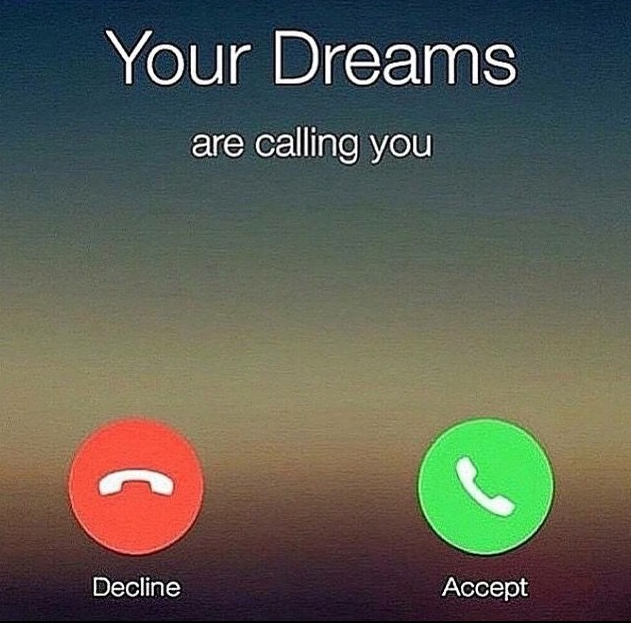
The freedom of managing your life is the most worthwhile thing
This is the single biggest takeaway that I can share with you.
I grew up believing that my work was just a means to an end; that I shouldn't expect to like my job or my work and that sitting at a desk doing uninspiring things for 40 hours a week was all I could ever hope for out of my life. This is such utter bullshit, you guys.
I've enjoyed a year of having the freedom to choose the work I want; to take an afternoon off to go shopping with a friend; to work on a Sunday or during the evening; to take a 3-week vacation to Central America and to work on the road.
I do what I want and am building my ideal life on my terms, and I get to grow something amazing and completely my own all from scratch. The work I do is fun and rewarding, and most importantly it makes my clients feel good, too.
Personal takeaways from 365+ days
I used to feel trapped by my life.
I didn't know what I wanted to do, where I wanted to go professionally, and I felt shackled to a corporate work and life that I resented and which, frankly, wasn't a good fit for me. It wasn't until I started building my client list and hanging out with other creatives and entrepreneurs that I realized that doing the thing that you love for a living is the key to being truly happy all the time.
The past 365+ days have been an exercise in un-learning a lot of things that I thought I knew about my value as a person and a creative professional. I've also learned so much about myself and have developed such a deep appreciation for my life that I can barely put it into words. It's been an exciting, challenging, and rewarding experience that I wouldn't trade for anything.
Thank you to my fantastic partner John, my incredible and supportive friends, and to my clients who do me the honour of working with me.
Alyson
How to Pull Yourself Out of a Creative Slump
- by Alyson Shane
Let's face it: even those of us who run our own businesses doing what we love for a living there are days where we feel more lukewarm than red-hot about it. It's normal! Not every day has to result in bubbly feelings, 110% productivity, and heaps of creative new ideas to jot down.
But what do you do when that dip in productivity becomes a lull... and then the norm?
This totally happened to me recently.
Don't get me wrong: my dedication to my clients hadn't faded, but my creative side - the side that feels like it shows when I write, for example - seemed to be taking a backseat to everything else that was going on in my life.
This is totally normal. It's normal for creative people to go through a dip in productivity, or a drought, but when you depend on your creativity to make a living there's a unique sort of pressure to get yourself together and get producing again.
With that in mind I wanted to share some of the steps I've taken to "get my groove back" so to speak, because you never know when a creative dry spell may occur:
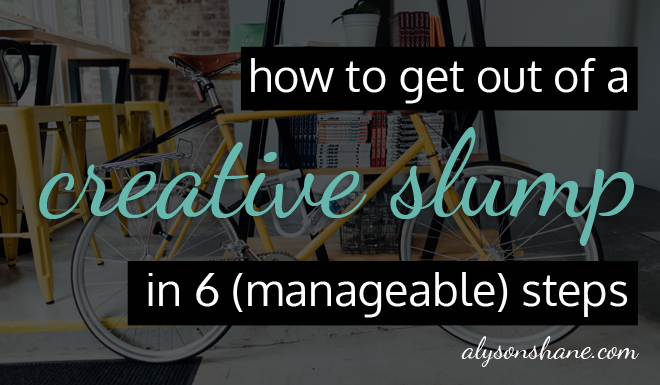
1. Acknowledge there's an issue
This is the worst. When you're in a creative slump it's easy to brush it off and say "I just don't feel like it right now!" or "I'll just get to it later" but you've got to be honest with yourself or you'll never snap out of it. You need to take a long, hard look at your screen (or canvas, or whatever) and admit: I haven't been working as hard at my craft as I usually do, and I need to snap out of it.
It's normal to feel guilty here; just let yourself feel bad for a few minutes... then let it go! The easiest way to make those guilty feelings go away is to do the thing that's making you feel bad, right?
2. Do it even if it sucks
The biggest hurdle to overcoming your creative slump is just sitting down to do the damn thing and not getting overwhelmed to the point where you're too in your head to produce anything of value. So what should you do instead? Sit down and create something of no value.
If you're a writer like me, do some free writing and experiment with different ideas, word combinations, and see what emerges; if you paint, just paint some stuff and let go of the expectation that it has to be your next masterpiece; you get the idea. Getting back into the habit of doing your craft will help you get back to feeling comfortable with it instead of intimidated and anxious.
3. Get active
When my anxiety flares up or I get super busy I'm the worst for letting my trips to the gym fall by the wayside. I try to go 2-3 times a week and I notice a definite slump in my mood, sleep, and creativity levels when I'm not exercising regularly. Recently I "scheduled" GAINZ time into my calendar Monday, Wednesday, and Friday mornings; that way it's just scheduled into my workday.
On days when I can't make it in the morning I try to go in the afternoon, but if all else fails I make a point to go for a walk, ride my bike somewhere, or do yoga at home (I'v also started doing this 10-minute yoga flow video in the afternoons to clear my head - it works, I swear!)
4. Read
Like I said, I've been struggling with a creative slump recently and when I sat down at my laptop today I hadn't intended to write blog post. I've been struggling to write consistently recently, but I still spend a lot of time online reading articles about a wide variety of topics because 1. I'm a voracious reader and 2. I have to in order to stay on top of my game professionally.
In any case, a few days ago John showed me a terrific series of posts on Derek Sivers' blog, one of which is called How to Be Useful to Others. One of the points goes as follows:
3. Share strong opinions.
Strong opinions are very useful to others.
Those who were undecided or ambivalent can just adopt your stance.
But those who disagree can solidify their stance by arguing against yours.
Even if you invent an opinion for the sole sake of argument, boldly sharing a strong opinion is very useful to others.
While it didn't really strike me at the time, those statements have been gnawing at me for a few days and were one of the things that inspired me to sit down and start trying to work past my writer's block. However, you can read whatever inspires you in order to get your spark back: novels, autobiographies of people you admire, or even some articles on Hacker News - whatever leaves you feeling inspred is stuff you should actively be seeking out and reading (or re-reading).
5. Write it out
Sometimes when I find myself struggling to put my thoughts to paper I do "free writing" session. Free writing is a technique where you literally just write whatever comes to mind without stopping to correct spelling, grammar, or focusing on a specific topic.
After reading the aforementioned Derek Sivers article I started typing... and oddly enough the bare bones for this post started to emerge. I wrote about feeling anxious about not writing as much, and as the words appeared on my screen I realized that I was stuck in a cycle of guilt over not creating which was actually stopping me from doing it.
I find this technique is especially helpful before I start writing something a bit more technical (like one of these blog posts) because it really clears out whatever's floating around in your head. Often whenever I find that I'm stuck on an idea or problem a little free writing clears out that mental clutter in no time!
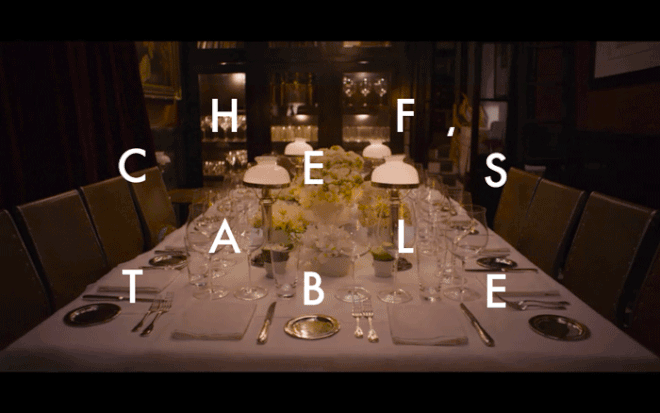
6. Watch & be inspired
I don't usually work with the TV on, but sometimes when I need a little creative background noise (like right now) I'll pop the TV on in the background and half-watch while I work on something. I find that it's best to put on something a bit soothing or slower-paced because watching stuff like action movies can be distracting (hint: don't try to focus on your craft while watching Deadpool).
One of my favourite shows is Chef's Table (it's available on Netflix - go binge-watch it when you're done reading this post!) because not only is it beautifully framed and shot, it also interviews highly creative people who have completely dedicated themselves to their craft and it's pretty impossible to not feel inspired while watching it.
Do you have any tips for getting that creative spark back? Tweet at me or tell me in the comments!
How Social Media & Blogging Helped Me Discover Who I Am
- by Alyson Shane
**Trigger warning** For some of you who come from abusive relationships, some of the content in this post may act as a trigger. Please read responsibly.
The other day Meg Athavale of LUMO shared a terrific article on Facebook called "The Psychological Price of Entrepreneurship" and one of the sections of the article really stood out for me:
Rather than showing vulnerability, business leaders have practiced what social psychiatrists call impression management--also known as "fake it till you make it."
This really struck a chord with me because as someone who makes their living online, keeping my personal brand as authentic as possible is one of my biggest priorities. Sure, I may not blog or tweet about every tough therapy session or anxiety that pops up, but as a business owner with an audience I believe that I have a responsibility to be transparent about the challenges in my life as well as my successes. I am a human being, after all.
With that in mind, I wanted to discuss the struggle that I've faced with reconciling my "authentic self" (aka, the one you see here, on social media, and in person) with the person that I was raised to believe that I was.
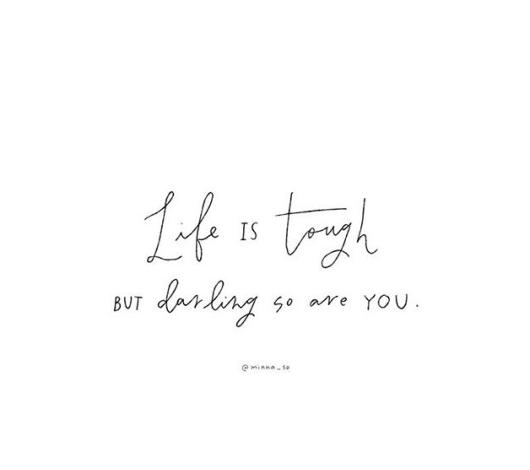
Some backstory
For those of you who don't know me personally, I haven't spoken to my parents or the majority of my family since early 2015 (you can read more about that here). Recently my brother had a baby, and I had to make the decision to not reach out or be involved. This wasn't a decision that I made lightly, but it was the right one for me and my mental health, and I stand by it.
This decision prompted my mother to leave a comment on my blog. Some of her statements (minus the attempts at gaslighting) included:
- For some reason Alyson, which I have to confess, escapes me, you seem to be under the impression that you are far superior to the rest of us.
- Maybe because you are a, 'writer', and can use, 'big', words, you think it gives you an advantage that we don't have.
- I think you need to get down off that pedestal you've erected for yourself and get rid of your overblown ego.
- You are so focused on living up to your superficial, 'queen of the Internet', alter ego, that you no longer know how to be a decent human being.
- Could it be that there is a wee bit of human in you after all?
The reason that I'm sharing these personal details is because I don't believe that vague descriptions adequately convey the narrative I grew up with. The comments you see above (which thankfully aren't a part of my life anymore beyond being a very helpful example for the sake of this article) were the things that were told to me on a daily basis.
Needless to say I entered adulthood as a pretty unhappy, insecure, and confused individual.
Discovering myself online
When I first started blogging back in 2003 I couldn't have predicted the multitude of ways that it would eventually come to change my life. I've always gravitated towards writing as my favourite form of self-expression, and blogging has always seemed like a natural and easy way to do it.
My blog is a reflection of who I am and the things that I feel are valuable and important to share, and from day one it caused issues between myself and my family. As illustrated in my mother's comments above, my ability to articulate and share my thoughts, and my willingness to do so, was seen as attempts at being superior and were frequently thwarted with threats of getting "cut out" of the family.
Despite this resistance from my home life I soon realized that I had found a community of like-minded individuals who wrote, shared, and published with the same authenticity that I wanted to be doing. In the late 2000's I started reading Raymi the Minx, the busblog, oceanaria, and a plethora of now-defunct but wonderful blogs who inspired me to be myself, no matter what. I'd always grown up believing that "nobody cared" about my thoughts or feelings, and the blogging community taught me that it wasn't true.
Around 2009 I also began discovering social networks. In particular I gravitated towards Twitter, which helped me express myself and connect with people whom I likely wouldn't have met otherwise. I doubt that I would have met Stef, Colin, Adrian, LJT, Kevin, and a variety of other wonderful people whom I now count among my dearest friends if it hadn't been for Twitter, and being active on this social network helped me expand my reach and connect with colleagues, clients, and a support system that I had never imagined was possible.
Around 2011 my active presence online as well as my obsession with internet culture and memes led to some of my Twitter followers (jokingly) dubbing me the "Queen of the Internet". As odd as it sounds, this nickname, however in jest, helped me start to develop a confidence that I had never experienced before. Suddenly people were turning to me to ask questions about social media and blogging on a regular basis. I started speaking at Red River College's Creative Communications program, at the MBlog conference, and my work was published in the local paper.
Contrasting these successes against the person that I had always believed myself to be (the selfish, superficial person who didn't care about anyone but herself) became harder and harder. Not only were my friends, colleagues, and peers informing a narrative which challenged my previous thoughts and feelings about myself, but I was starting to slowly stop believing those things, as well.
The catalyst
In retrospect the biggest change in perspective came when I published my post Living with the Mean Reds, which detailed how it felt to live with anxiety and feelings of low self-worth every day. At the time I was terrified of hitting "publish", and I was overwhelmed and surprised at the outpouring of support and kind words that I received as a result.
Social media and blogging provided me with a supportive community where over time I was able to learn to shed the negative self-image that I'd grown up believing. By having a space that was completely free from my family's influence I was able to start growing, learning, and not being so afraid all the damn time. I started a business, I started therapy, and I started investing my time and energy into the things that really mattered instead of indulging in drama because I felt obligated to participate
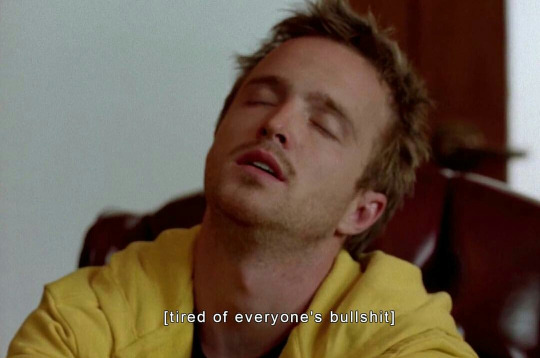
Support from these communities help me finally realize that refusing to make room for the negative things in my life doesn't make me a bad person. It means I have a deep enough understanding of my needs to make hard (and sometimes unpopular) decisions.
Why does this matter?
Social media and blogging are extremely powerful tools which can connect us with people all over the world. They allow us to find communities and support systems online we can start to explore parts of ourselves that scare us, or that we don't feel we can express to the people in our day-to-day lives.
By finding ways to express myself online I was able to discover things about myself, make connections, and find opportunities that simply wouldn't have been available to me otherwise. The encouragement I received from my followers, readers, friends, and my very supportive partner led me to where I am today, and though I'm not perfect I'm working hard at building the life I want and deserve.
Sharing this stuff isn't easy. It's doesn't feel great to admit that my mother is the way that she is, or that my family doesn't understand who I am, but it's the reality that I'm in and I'm thankful to be able to have a platform through which I can share these thoughts and experiences as I work through them.
Through blogging and on social media I was able to find a place for myself and connect with communities of supportive and like-minded individuals who helped me start making a place for myself in the real world and, most importantly, in my own eyes.
Most of the bloggers I've followed over the years don't know how much they helped me, and there's a good chance that if my words help someone that I may never know, either. But if reading about the challenges that I've faced helps someone else seek out the supports they need to start healing and being happy, then that matters a great deal, and I'm happy to share my stories and be a part of that process and thankful to be able to help.
As always, thanks for reading, and thanks for being here with me while I figure this stuff out.
(If anything I've described in this post re: family expectations, relationships, or narratives imposed upon you by your family sounds familiar, I strongly encourage you to check out /r/raisedbynarcissists, a wonderfully supportive Reddit community that has helped me a lot.)
20 Must-Watch TED Talks for Creatives & Entrepreneurs
- by Alyson Shane
Regardless of how much you love what you do, there are inevitably doing to be times when you're feeling down, or uninspired, or are simply suffering from a lack of motivation (I know those feels).
When I'm feeling down I like to find a fun project to work on (like doing some writing, editing photos, etc) and put on a good TED Talk to listen to while I work. I love hearing other people's thoughts and stories, and have actually been using TED Talks to get inspired since 2007, when I worked a mind-numbingly dull job as an accounting assistant in a government office. I hated my job, and listening to people with big ideas, dreams, and goals made me feel a little less crazy for being underwhelmed with my current circumstances.
These days I certainly feel a lot better about what I do day-to-day, there are still times when a little verbal pick-me-up is required to get those creative juices flowing again. With that in mind, I wanted to share some of my favourite talks to help you stay motivated:
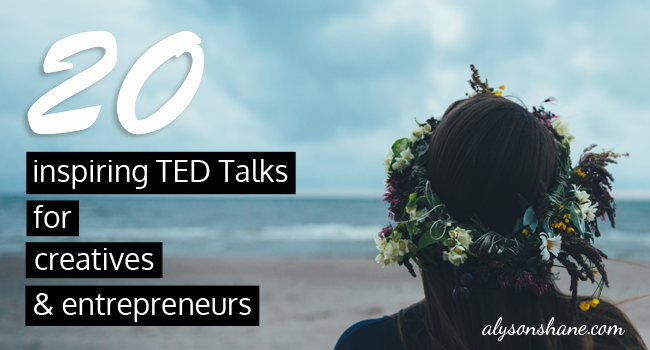
*I also happen to have ASMR, and for those of you lucky enough to experience the same lovely sensations when listening to people speak, I've put a little asterisk next to the ones that give me the best kinds of brain-tingles.
Inspiring Talks
I'm a sucker for a good cheesy talk, and nothing snaps me out of a funk faster than listening to a few talks about dreaming big and going for it. In particular I'd recommend checking out Amanda Palmer's talk; hearing hers was pivotal for me in learning to ask other people for help and admitting that (gulp!) maybe I don't know everything.
Steve Jobs: How to Live Before You Die
Simon Sinek: How Great Leaders Inspire Action
Adam Grant: The Surprising Habits of Original Thinkers
Dan Pink: The Puzzle of Motivation
Amanda Palmer: The Art of Asking
Business & Success Talks
I've been listening to talks about business since... well, long before running my own business ever crossed my mind. In particular I'm drawn to talks that tackle issues like healthy workplaces, finding work that matters to you, and spreading your ideas successfully.
Bill Gross: The Single Biggest Reason Why Startups Succeed
Barry Schwartz: The Way We Think About Work is Broken
Scott Dinsmore: How to Find Work You Love
Seth Godin: How to Get Your Ideas to Spread
Dan Ariely: What Makes Us Feel Good About Our Work?*
Yves Morieux: As Work Gets More Complex, 6 Rules to Simplify*
Creativity & Happiness Talks
Two of the talks in this category are ones I've been listening to for several years. They're always good to come back to when I need a refresher that creativity isn't something that just disappears (though sometimes it feels that way) and that I have to actively work at being happy.
Matthieu Ricard: The Habits of Happiness*
Carol Dweck: The Power of Believing That You Can Improve
Ken Robinson: Do Schools Kill Creativity?*
Dan Gilbert: The Surprising Science of Happiness
Tim Harford: How Frustration Can Make Us More Creative
General Interesting Talks
Below are a few of my favourite talks that didn't really fit into any of the above categories, but I find myself revisiting again and again because they're just that good.
Ole Scheeren: Why Great Architecture Should Tell a Story*
Yanis Varoufakis: Capitalism Will Eat Democracy -- Unless We Speak Up
Yves Morieux: How Too Many Rules at Work Keep You From Getting Things Done*
Dan Gross: Why Gun Violence Can't Be Our New Normal
Do you have any favourite videos that you play to stay motivated and find inspiration? Tweet them at me or tell me in the comments!
Being a Small Business Owner: 5 Things You Need to Know
- by Alyson Shane
Today I did a "big kid" business owner task and complied all of my information to send to my accountant for tax time. It was stressful, a little bit chaotic, but ultimately felt good to be done and over with.
The reason it took me so long (and caused me more than a little anxiety) is because when I started my business a year and a half ago I didn't expect it to scale so quickly, and as a result I kind of floundered through the first few months of it without real systems in place to help me stay organized.
Now, boy do I know better.
Largely what I know has come through trial and error, but I've also had some great discussions with friends, colleagues, and mentors who have helped me figure this stuff out and get on the right track. And, since sharing is caring, I figured I'd share a list of 5 of the most important thins I've learned with you:
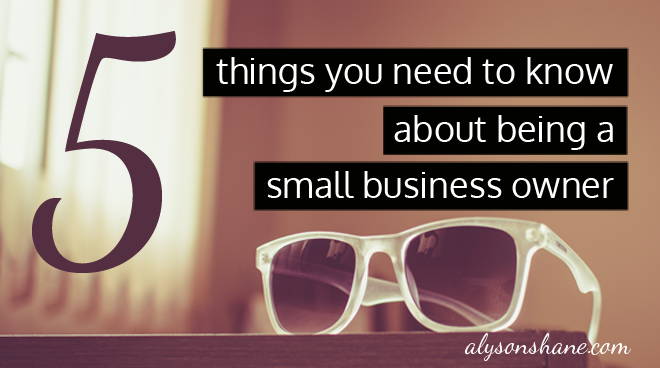
1. Every day is unpredictable
This is probably the biggest understatement of the century! I do my best to be as organized as possible and use checklists and planners, but sometimes a client throws a curveball my way which eats up my entire day.
As a result, I've had to learn to be a lot more flexible. Not just with my time, but with my expectations of what I planned to accomplish during that time. Clients will often send pressing need-to-handle emails moments before they actually need something, or someone will call me while I'm in the middle of writing an in-depth piece, or any variety of things. Whatever the case, be prepared for the unexpected.
2. Developing your systems early on is a lifesaver
Believe me, you'll thank yourself later. Like I mentioned at the top of this post, when I first started freelancing I didn't give much thought to how my folders were organized, where my invoices went, how I tracked my time... you get the drift.
Do as I say, not as I do. Here are some tips to develop strong systems:
- Pick a file structure and stick to it. Be consistent in your folders and sub-folders!
- Use invoice numbers to keep track of your invoices, and use a spreadsheet to track what's outstanding and what has been paid (I recently started doing this thanks to a conversation with my friend Elise and it's a lifesaver)
- Track your time. I use Toggl to keep track of everything I'm doing, and review my logs often to figure out what I'm spending the most amount of time on.
- Use the heck out of your calendar.
3. You'll think about work constantly
When you own something and you're trying to build it, it's almost always on your mind, and that's totally okay!
In fact, it's probably the thing that is going to make you successful and keep your business from going under, because if you're always thinking about it, then you're more likely to come up with new ideas, systems to streamline your processes, and ways to hustle your product or services.
I'll be honest: if you're the kind of person who wants punch the clock and then forget about everything you did Monday to Friday, then this isn't the lifestyle for you.
4. You'll always have stuff to do
This can actually feel overwhelming from time to time, because even when I've checked off all of my client "to dos" there's still a long (looooong) laundry list of things that I need to take care of to make sure my business is running smoothly. This could be anything from developing new products, to researching a new social trend, to filling up my content calendar... there's never a dull moment.
There are definitely times when this can feel overwhelming, but that's totally normal! Just take a deep breath, grab a glass of wine (or whiskey), pump some music and push though the first few items on your to-do list. Trust me, once you've checked a few off you will feel a million timed better.
5. You'll feel guilty when you "switch off"
(but do it anyway)
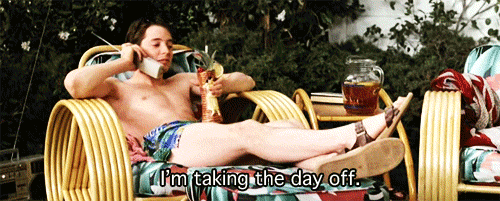
It's important to have rest days and days where your eyes aren't glued to your computer screen, or you don't set foot in your store (if you have a brick-and-mortar business) because - trust me on this - you will burn out, honey. Even if you can't entirely unplug, set aside a few hours of "me time" and take a bath, hit the gym, grab a greasy burger with your besties... whatever you need to do to unwind and recharge your batteries.
When I was on vacation in Central America for three weeks I definitely had bouts of "oh my god, will my business be there when I get back?!" but you know what? Being away from the day-to-day tasks helped me come up with some really terrific ideas, and when I came back I felt 100% refreshed and ready to dive headlong into things. I highly recommend vacations, even short ones, specifically for this purpose.
The truth of the matter is that there are a million other things you "need to know" about running a small business (which I'm sure I'll get around to blogging about at some point!) but what it really boils down to is that it's a crazy, intense, rollercoaster of fun, stress, and good vibes.
All my luck to you in your small biz adventure!
Want more posts like this? Tell me what you'd like me to blog about next on Twitter, via email, or in the comments!
